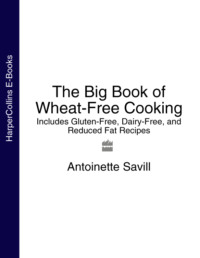Książki nie można pobrać jako pliku, ale można ją czytać w naszej aplikacji lub online na stronie.
Czytaj książkę: «The Big Book of Wheat-Free Cooking: Includes Gluten-Free, Dairy-Free, and Reduced Fat Recipes»
The Big Book of Wheat-Free Cooking
A fabulous collection of
180 seasonal recipes
Antoinette Savill

Contents
Cover
Title Page
How to Use the Symbols
Becoming Wheat-Free
At-a-Glance Do’s and Don’ts for a Healthy, Wheat-Free Diet
At-a-Glance Guide to Common Foods That Contain Wheat, Gluten and Dairy
My List of Useful Ingredients
Introduction to the Recipes
Soups
Canapés, Appetizers and Snacks
Fish and Seafood
Meat, Poultry and Game
Salads
Vegetarian Main Courses
Vegetables and Accompaniments
Cold Desserts
Warm Desserts
Cakes and Cookies
Baking
Breakfasts
Menu Planning Tips
Menu Plans
Index of Recipes
Useful Information and Addresses
Organizations
Stockists
Index
Acknowledgements
Also by the Author
Copyright
About the Publisher
How to Use the Symbols
The symbols shown below are used throughout the book to enable you to judge the suitability of each recipe. A wheat-free symbol is not included because every recipe is wheat free. An asterisk beside an ingredient indicates that it may contain gluten, so check and if necessary use an alternative gluten-free brand.
Note that many of the recipes that are not marked as dairy free could be easily converted to such by using dairy-free margarine instead of butter and soya milk and yogurt in place of the standard dairy product. Similarly, many of the recipes that are not marked as vegetarian could easily be converted by using vegetarian products instead of meat – often you will find vegetarian options given in the introduction to the such recipes.
 | GF = Gluten Free (which is wheat free) |
 | DF = Dairy Free and Lactose Free |
 | V = Vegetarian (which is suitable for vegetarians but not vegans) |
 | RF = Reduced Fat (which is lower in fat for weight control) |
 | Q&E = Quick and Easy recipe |
Becoming Wheat-Free
The buzzword for the future is wheat-watching. In countries such as the UK, Australia and the USA, the trend has already begun, with growing numbers of people avoiding wheat, either permanently or for short periods, to improve their health and energy.
However, when it comes to putting it into practice, the decision to go wheat free can be a little more difficult than one might think – not just because of the countless wheat-based products such as breads, pastas, pastries, cakes and cookies that are on the market but also because so many other products may surreptitiously contain wheat. You may be surprised to find that wheat is used to bulk out or stabilize many foods. For instance, nearly all processed, frozen or canned foods contain wheat, including soups, mayonnaise, sausages and frozen French fries. In addition, many manufactured products, such as soy sauce, contain very small amounts of wheat. Such tiny quantities may not cause problems for most people but those who have a wheat allergy or coeliac disease must ensure that everything they eat is entirely wheat free.
It’s all too easy to dwell on the negative effects that some foods can have on us but we mustn’t forget that food can act as a very healing medicine. It is vital then that we stop and consider what we are putting into our bodies and what effect it has on us physically and emotionally before we charge gung ho round the supermarket, throwing anything in our trolley.
Thankfully shopping has become a less arduous task for wheat-watchers over recent years, as an increasing number of wheat-free ingredients and products have become available. Take a look in the ‘well-being’ and organic aisles, for instance, and you’ll find lots of interesting new wheat-free products from all over the world. Alternatively, you can buy the foods and ingredients that you need from health food shops, by mail order or on the internet (you’ll find a helpful list of stockists here).
Thanks to chefs like Jamie Oliver, cooking is now tremendously popular again – even amongst the young, many of whom are seeing it as cool for the first time. The TV food programs portray the fun and excitement of cooking and I want to show that cooking for food intolerance needn’t be any different. The recipes in this book will ensure that cooking is an enjoyable experience – no matter what your age or level of experience.
With today’s fast pace of life, shared family meals have inevitably become rare. Lifestyle changes and busy schedules mean that TV dinners and the general ‘grab and graze’ culture have become part of our way of looking at food and cooking it. However, I hope that the selection of quick, easy and comforting recipes in this book will encourage a return to everyone congregating in the kitchen and helping to prepare a delicious meal, as well as chatting and dining together.
Darmowy fragment się skończył.
